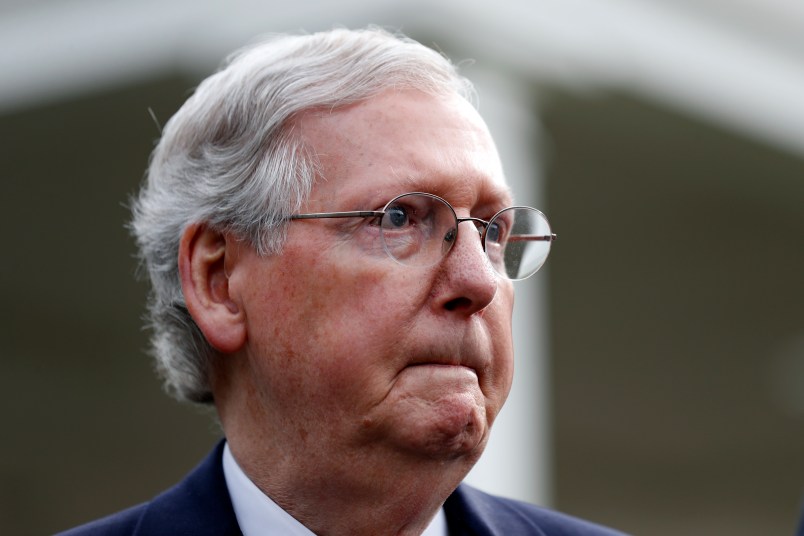Caitlin MacNeal contributed reporting.
Senate Republicans wrapped up their work week in Washington Thursday without a clear deal on how to move forward on their stalled Obamacare repeal legislation. Instead, they were entertaining a set of new proposals that a week ago would have been unthinkable, but now appear to be their Hail Mary pass to break the impasse within the conference that is keeping the bill, the Better Care Reconciliation Act, short of the 50 votes Majority Leader Mitch McConnell (R-KY) needs to pass it.
When McConnell delayed plans for a procedural vote earlier this week, the hope among Republicans was that a few days more of negotiations would get the conference towards some sort of agreement by Friday, so a revised bill could be sent to the Congressional Budget Office to be scored in time for them to vote on it soon after they returned from their 11-day July 4 recess.
Now it appears they’ll be heading home—where they’ll be facing the pressure of their constituents and the governors who have come out against a bill—with a few more ideas to chew on, but no clear sign they have found the magic formula to overcome their disagreements.
“If I had my druthers, I wish we had gone ahead and gotten a product agreed to,” Sen. Roger Wicker (R-MS)—who last year was in charge of the Senate GOP’s campaign arm—told reporters after the Senate Republicans’ private lunch on Thursday.
“We’re kind of at a stalemate right now I’d say” – Sen Capito just now
— Erica Werner (@ericawerner) June 29, 2017
Among the proposals Republicans are discussing is a push by some of the moderates to not fully repeal one of the Affordable Care Act’s taxes—at least not immediately— as a revenue booster to pay for more generous subsidies. They’re eying specifically Obamacare’s 3.8 percent net investment tax, though some Republicans, include Sen. Ted Cruz (R-TX) have said they oppose the idea.
Regardless, it is one of the issues that leadership is looking at, Sen. Bob Corker (R-TN) told reporters Thursday.
“I don’t think a sustainable proposition is to repeal a tax on the wealthy and pass a burden onto the poor. That’s not an equation that works. And so that equation is being shifted now,” Corker said.
Cruz, meanwhile, is pushing an amendment that would let insurers sell plans that don’t comply with the Obamacare regulations the Senate bill would keep on the books, as long as they also sell plans that include the pre-existing conditions protections the initial bill sought to keep.
From a policy perspective, such a system presents a major adverse selection problem, as healthy people flock to the skimpier, non-regulated plans, and as premiums for the comprehensive plans continue to rise because they are primarily being used by costly, high-risk individuals. Cruz acknowledged that his amendment would require the subsidies available in the Obamacare exchanges in order to work—a notable admission from one of the most dogmatic conservatives on the Hill. Other Republicans cautioned that their support hinged on whether tweaks could be made to prevent a death spiral.
“It has to be constructed in a way that that ensures that the pools aren’t adversely affected,” Sen. John Thune (R-SD), the No. 3 in the Senate GOP leadership, told reporters Thursday. “And I think there was some discussion yesterday about ways in which you could incorporate that.”
Politically, the proposal invites attacks that Republicans are violating their promise to protect consumers with pre-existing conditions.
“It’s unclear what it is,” Sen. Rob Portman (R-OH) said, when asked if he could support Cruz’s amendment. “I believe that if you have pre-existing conditions, you should be able to get coverage and that still needs to be resolved.”
Then there’s the question of whether the amendment would pass muster under the strict rules of the so-called “reconciliation” process Republicans are using to avoid Democratic filibuster.
Either way, the amendment proposal is shaping up as a major fight. A spokesman for Sen. Mike Lee (R-UT), who came out against the draft version of the bill released last week, said that Lee was waiting to see the text but that he would be supportive if the amendment does what it says.
House Freedom Caucus Mark Meadows (R-NC) was on the Senate side of the Capitol to weigh in on the health care talks, where he told reporters he was supportive of Cruz’s amendment and it could take the place of a waiver amendment in the House bill that previously won the support of Freedom Caucus at a critical moment. Getting his approval of a Senate bill greases the path for a quick, up-0r-down vote of a Senate bill in the House, and avoids a messy conference process where the differences between House and Senate legislation are typically worked out.
The upshot of these discussions—whether or not the Cruz amendment or some of Obamacare’s taxes are included in the final Senate bill—is that they burn more days and push the repeal effort into July, when Republicans were hoping to move on to other important issues.







Isn’t this the whole point of the GOP?
The headline had me at:
At what point do we start to demand that they sit down with Democrats?
How can I continue to be amazed at their callousness. I know it. I’ve known it for a long time. Still surprised.
You can’t polish a turd, but they will try just the same…